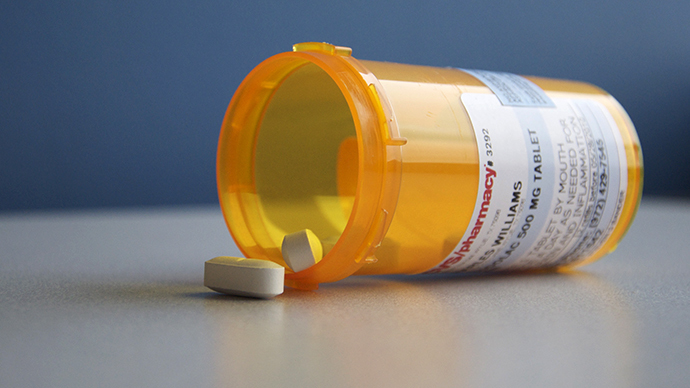Doctors warn new FDA-approved painkiller is deadly dangerous

A new painkiller set to hit the market in March is coming under heavy fire from doctors and lawmakers warning of its powerful ability to kill.
Although the opiate Zohydro was ultimately approved by the US Food and Drug administration, that endorsement went against the recommendation given by the agency’s own advisory panel. The panel voted 11 – 2 against approving the drug, but the FDA argued its availability is necessary to help patients unfazed by current medication.
The new drug hasn’t become available yet, but a group of more than 40 doctors is hoping to preempt its release by urging the FDA to reconsider its decision. According to the letter penned by the doctors, Zohydro is five to 10 times stronger than its nearest equivalent, Vicodin, and has the potential to cause a severe rise in overdose deaths.
The doctors warned that the drug could potentially kill an individual after taking only two Zohydro capsules. A child, meanwhile, could suffer a fatal overdose from just one pill.
“In the midst of a severe drug addiction epidemic fueled by overprescribing of opioids, the very last thing the country needs is a new, dangerous, high-dose opioid,” the letter reads.
Speaking to Forbes, Andrew Kolodny, of the advocacy group Physicians for Responsible Opioid Prescribing, was even more direct: “It’s a whopping dose of hydrocodone packed in an easy-to-crush capsule. It will kill people as soon as it’s released.”
According to NBC News, Congressional representatives and attorney generals from 28 states have also called on the FDA to reconsider the drug’s approval.
Although Zohydro is comprised of the same ingredients found in Vicodin and OxyContin, but it’s not just the higher dose that has medical experts and lawmakers concerned. As RT reported in November, the FDA did not mandate Zohydro to follow the same abuse-deterrents that other drugs do. As a result, the drug will remain just as effective if crushed, snorted, or taken in a way other than originally intended. All this has opponents worried that Zohydro’s potential for abuse greatly exceeds that of other options on the market.
Still, some doctors believe the strong dosage would benefit a select group of patients. Dr. Zonfu Chen of the University Pittsburgh Medical Center East told NBC that Zoyhdro could be helpful to patients who cannot take pain medication outside of hydrocodone.
"The bottom line is no matter which narcotic you're talking about, if you don't use it right it can be abused,” Chen said. “It can be addictive. It all depends on how doctors monitor it. It could be lifesaving. But if used the wrong way, like any medication, it can cause trouble."
Forbes noted that Zohydro’s manufacturer, Zogenix, has also claimed the drug does not contain acetaminophen, which Vicodin does, and therefore is actually safer to use. Others say that difference is negligible, since there are similar medications already available.
The letter to the FDA also placed Zohydro in a larger context regarding drug use in the United States. It noted that 2012 data by the International Narcotics Control Board found Americans consume more than 99 percent of the world’s hydrocodone supply and 84 percent of the global stock of oxycodone.
According to the Centers for Disease Control and Prevention, overdose deaths in the US have skyrocketed since 1999, from roughly 4,000 to nearly 17,000 in 2010.
Although the FDA only reconsiders its rulings on rare occasions, Dr. Jeanmarie Perrone of the University of Pennsylvania School of Medicine told NBC it’s possible. "There is precedent for reversing,” she said. “I think it could be reevaluated.”














